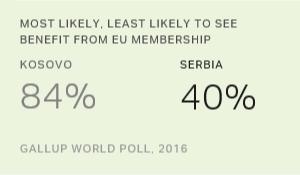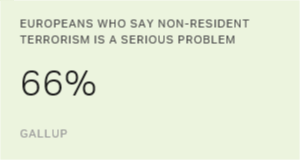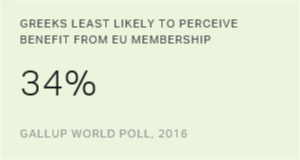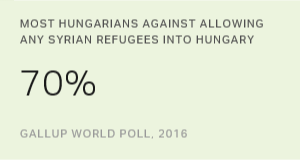Story Highlights
- Majorities in four of six Balkan countries see benefit in joining the EU
- Serbians exhibit highest level of euroskepticism
WASHINGTON, D.C. -- Ahead of the annual Western Balkans Summit on Wednesday among leaders from the European Union and six Western Balkan countries hoping to join the bloc, Gallup surveys find that residents of all six countries are more likely to say membership would benefit rather than harm their countries. This includes majorities in four of the six countries.
| Benefit | Harm | Neither/Both | |||||||||||||||||||||||||||||||||||||||||||||||||||||||||||||||||||||||||||||||||||||||||||||||||
|---|---|---|---|---|---|---|---|---|---|---|---|---|---|---|---|---|---|---|---|---|---|---|---|---|---|---|---|---|---|---|---|---|---|---|---|---|---|---|---|---|---|---|---|---|---|---|---|---|---|---|---|---|---|---|---|---|---|---|---|---|---|---|---|---|---|---|---|---|---|---|---|---|---|---|---|---|---|---|---|---|---|---|---|---|---|---|---|---|---|---|---|---|---|---|---|---|---|---|---|
| % | % | % | |||||||||||||||||||||||||||||||||||||||||||||||||||||||||||||||||||||||||||||||||||||||||||||||||
| Kosovo | 84 | 4 | 4 | ||||||||||||||||||||||||||||||||||||||||||||||||||||||||||||||||||||||||||||||||||||||||||||||||
| Albania | 80 | 10 | 2 | ||||||||||||||||||||||||||||||||||||||||||||||||||||||||||||||||||||||||||||||||||||||||||||||||
| Bosnia and Herzegovina | 59 | 21 | 13 | ||||||||||||||||||||||||||||||||||||||||||||||||||||||||||||||||||||||||||||||||||||||||||||||||
| Macedonia | 58 | 18 | 13 | ||||||||||||||||||||||||||||||||||||||||||||||||||||||||||||||||||||||||||||||||||||||||||||||||
| Montenegro | 49 | 25 | 17 | ||||||||||||||||||||||||||||||||||||||||||||||||||||||||||||||||||||||||||||||||||||||||||||||||
| Serbia | 40 | 34 | 17 | ||||||||||||||||||||||||||||||||||||||||||||||||||||||||||||||||||||||||||||||||||||||||||||||||
| Gallup World Poll, 2016 | |||||||||||||||||||||||||||||||||||||||||||||||||||||||||||||||||||||||||||||||||||||||||||||||||||
At the summit, EU officials and leaders from the six EU hopeful countries are expected to flesh out a proposal for a regional common market, which could help prepare these countries for the EU's single market.
With at least four in five residents saying EU membership would benefit their country or region, views in Albania and Kosovo are the most positive by far. As two of the poorest areas in the region with high unemployment rates, residents may associate membership with a means to improve their living standards and stimulate job growth.
Of the six, Montenegro and Serbia are the only Balkan candidate countries engaged in accession talks. People living in Serbia, however, are the most divided on EU membership. Part of this skepticism appears to be driven by historical grievances associated with the 1999 NATO bombing of Serbia to prevent the ethnic cleansing of Kosovar Albanians. The dominant expectation among EU countries that Serbia recognize Kosovo's independence before joining the bloc likely exacerbates this resentment.
Serbian Residents of Balkans Divided on EU Membership
Serbian populations in some other Balkan countries appear equally divided. Differences in standard demographics such as gender, age and education level make little difference in people's views on potential EU membership. Nationality creates dividing lines that mirror EU support. For instance, ethnic Bosnians and Montenegrins are almost twice as likely to view entry into the EU as beneficial when compared with Serbians living in those respective countries.
| Serbians | Bosnians | Croatians | Montenegrins | Macedonians | Albanians | ||||||||||||||||||||||||||||||||||||||||||||||||||||||||||||||||||||||||||||||||||||||||||||||
|---|---|---|---|---|---|---|---|---|---|---|---|---|---|---|---|---|---|---|---|---|---|---|---|---|---|---|---|---|---|---|---|---|---|---|---|---|---|---|---|---|---|---|---|---|---|---|---|---|---|---|---|---|---|---|---|---|---|---|---|---|---|---|---|---|---|---|---|---|---|---|---|---|---|---|---|---|---|---|---|---|---|---|---|---|---|---|---|---|---|---|---|---|---|---|---|---|---|---|---|
| % | % | % | % | % | % | ||||||||||||||||||||||||||||||||||||||||||||||||||||||||||||||||||||||||||||||||||||||||||||||
| Bosnia and Herzegovina | 38 | 69 | 50 | - | - | - | |||||||||||||||||||||||||||||||||||||||||||||||||||||||||||||||||||||||||||||||||||||||||||||
| Montenegro | 32 | - | - | 63 | - | - | |||||||||||||||||||||||||||||||||||||||||||||||||||||||||||||||||||||||||||||||||||||||||||||
| Macedonia | - | - | - | - | 50 | 83 | |||||||||||||||||||||||||||||||||||||||||||||||||||||||||||||||||||||||||||||||||||||||||||||
| Gallup World Poll, 2015-2016 | |||||||||||||||||||||||||||||||||||||||||||||||||||||||||||||||||||||||||||||||||||||||||||||||||||
A combination of internal and external factors may contribute to the skepticism among Serbs. While governing parties in Serbia have committed to the path of EU accession, nationalist politicians across the region have adopted platforms that tap into the historical narrative of Western hostility. With an interest in halting the spread of Western influence in the region, Russia is seen by some as promoting such behavior. The Republika Srpska's recent referendum to declare Jan. 9 an official holiday is one such example. Seen as a provocative trial run for a plebiscite on secession from Bosnia and Herzegovina, the international community -- including Serbia -- condemned this action. Only Russia lent support.
Serbs are more likely than any other nationality in the Balkans to express approval of Russian leadership. Fifty-four percent of Serbs approved of Russia's leadership over the past two years, while only 28% approved of the EU's leadership. Among those who approve of Russian leadership, majorities in five of the six countries still see more benefit than harm in joining the EU. Serbs remain the most divided.
| Benefit | Harm | Neither/Both | |||||||||||||||||||||||||||||||||||||||||||||||||||||||||||||||||||||||||||||||||||||||||||||||||
|---|---|---|---|---|---|---|---|---|---|---|---|---|---|---|---|---|---|---|---|---|---|---|---|---|---|---|---|---|---|---|---|---|---|---|---|---|---|---|---|---|---|---|---|---|---|---|---|---|---|---|---|---|---|---|---|---|---|---|---|---|---|---|---|---|---|---|---|---|---|---|---|---|---|---|---|---|---|---|---|---|---|---|---|---|---|---|---|---|---|---|---|---|---|---|---|---|---|---|---|
| % | % | % | |||||||||||||||||||||||||||||||||||||||||||||||||||||||||||||||||||||||||||||||||||||||||||||||||
| Albania | 87 | 9 | 1 | ||||||||||||||||||||||||||||||||||||||||||||||||||||||||||||||||||||||||||||||||||||||||||||||||
| Kosovo | 69 | 9 | 9 | ||||||||||||||||||||||||||||||||||||||||||||||||||||||||||||||||||||||||||||||||||||||||||||||||
| Bosnia and Herzegovina | 55 | 30 | 10 | ||||||||||||||||||||||||||||||||||||||||||||||||||||||||||||||||||||||||||||||||||||||||||||||||
| Macedonia | 53 | 25 | 15 | ||||||||||||||||||||||||||||||||||||||||||||||||||||||||||||||||||||||||||||||||||||||||||||||||
| Montenegro | 54 | 29 | 13 | ||||||||||||||||||||||||||||||||||||||||||||||||||||||||||||||||||||||||||||||||||||||||||||||||
| Serbia | 45 | 33 | 15 | ||||||||||||||||||||||||||||||||||||||||||||||||||||||||||||||||||||||||||||||||||||||||||||||||
| Gallup World Poll, 2015-2016 | |||||||||||||||||||||||||||||||||||||||||||||||||||||||||||||||||||||||||||||||||||||||||||||||||||
Implications
Overall, entry into the EU remains an attractive objective across the region -- residents are more likely to see membership as beneficial rather than harmful. In the aftermath of Brexit, the Western Balkans Summit this week aims to re-energize the idea of enlargement and map out the next steps toward accession or candidacy status for EU hopefuls.
Survey Methods
Results are based on face-to-face interviews with at least 1,000 adults, aged 15 and older, conducted in 2015 and 2016 in Albania, Bosnia and Herzegovina, Kosovo, Macedonia, Montenegro and Serbia. For results based on the total sample of national adults in each country, the margin of sampling error is ±3.4 to ±3.7 percentage points at the 95% confidence level. All reported margins of sampling error include computed design effects for weighting.
For more complete methodology and specific survey dates, please review Gallup's Country Data Set details.




